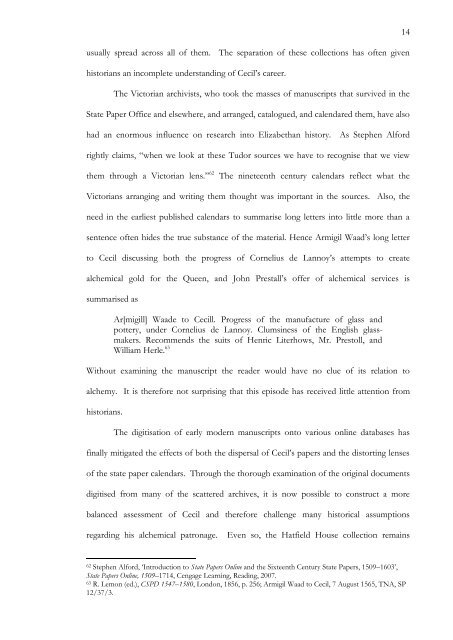The Alchemical Patronage of Sir William Cecil, Lord Burghley
The Alchemical Patronage of Sir William Cecil, Lord Burghley
The Alchemical Patronage of Sir William Cecil, Lord Burghley
Create successful ePaper yourself
Turn your PDF publications into a flip-book with our unique Google optimized e-Paper software.
usually spread across all <strong>of</strong> them. <strong>The</strong> separation <strong>of</strong> these collections has <strong>of</strong>ten given<br />
historians an incomplete understanding <strong>of</strong> <strong>Cecil</strong>‘s career.<br />
<strong>The</strong> Victorian archivists, who took the masses <strong>of</strong> manuscripts that survived in the<br />
State Paper Office and elsewhere, and arranged, catalogued, and calendared them, have also<br />
had an enormous influence on research into Elizabethan history. As Stephen Alford<br />
rightly claims, ―when we look at these Tudor sources we have to recognise that we view<br />
them through a Victorian lens.‖ 62 <strong>The</strong> nineteenth century calendars reflect what the<br />
Victorians arranging and writing them thought was important in the sources. Also, the<br />
need in the earliest published calendars to summarise long letters into little more than a<br />
sentence <strong>of</strong>ten hides the true substance <strong>of</strong> the material. Hence Armigil Waad‘s long letter<br />
to <strong>Cecil</strong> discussing both the progress <strong>of</strong> Cornelius de Lannoy‘s attempts to create<br />
alchemical gold for the Queen, and John Prestall‘s <strong>of</strong>fer <strong>of</strong> alchemical services is<br />
summarised as<br />
Ar[migill] Waade to <strong>Cecil</strong>l. Progress <strong>of</strong> the manufacture <strong>of</strong> glass and<br />
pottery, under Cornelius de Lannoy. Clumsiness <strong>of</strong> the English glassmakers.<br />
Recommends the suits <strong>of</strong> Henric Literhows, Mr. Prestoll, and<br />
<strong>William</strong> Herle. 63<br />
Without examining the manuscript the reader would have no clue <strong>of</strong> its relation to<br />
alchemy. It is therefore not surprising that this episode has received little attention from<br />
historians.<br />
<strong>The</strong> digitisation <strong>of</strong> early modern manuscripts onto various online databases has<br />
finally mitigated the effects <strong>of</strong> both the dispersal <strong>of</strong> <strong>Cecil</strong>‘s papers and the distorting lenses<br />
<strong>of</strong> the state paper calendars. Through the thorough examination <strong>of</strong> the original documents<br />
digitised from many <strong>of</strong> the scattered archives, it is now possible to construct a more<br />
balanced assessment <strong>of</strong> <strong>Cecil</strong> and therefore challenge many historical assumptions<br />
regarding his alchemical patronage. Even so, the Hatfield House collection remains<br />
62 Stephen Alford, ‗Introduction to State Papers Online and the Sixteenth Century State Papers, 1509–1603‘,<br />
State Papers Online, 1509–1714, Cengage Learning, Reading, 2007.<br />
63 R. Lemon (ed.), CSPD 1547–1580, London, 1856, p. 256; Armigil Waad to <strong>Cecil</strong>, 7 August 1565, TNA, SP<br />
12/37/3.<br />
14















